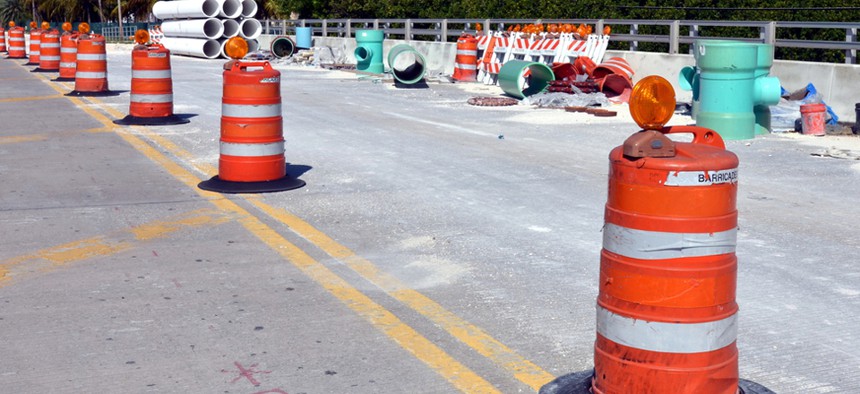
Chuck Wagner/Shutterstock.com
Auditor: Funding Shortfall Could Halt Transportation Projects
With the Highway Trust Fund depleted, federal payments to states could be delayed.
The nation's Highway Trust Fund is almost dried up, federal payments to states for transportation projects starting this summer will have to be delayed, and lawmakers face just three options to deal with the projected shortfalls, a top congressional auditor testified on Tuesday.
Lawmakers could decide to cut promised spending to deal with projected highway shortfalls, meaning that no new obligations from the fund's highway account or its account for transit projects would be made in fiscal 2015. They could also raise revenues for the highway fund, such as hiking taxes on motor fuels or imposing new tolls on highway users.
Or lawmakers could continue to transfer "supplemental amounts" from the federal budget's general fund, which would have to be paid for by reducing spending on other programs or increasing taxes, to avoid adding to deficits and increasing federal borrowing.
Perhaps some combination of these three approaches also could be undertaken, said Joseph Kile, the assistant director for microeconomics studies at the Congressional Budget Office, in his testimony submitted to the Senate Finance Committee. But he left no doubt that the situation is dire.
Most spending for transportation and infrastructure projects comes from state and local governments, with about one-quarter coming from the federal government, primarily through the Highway Trust Fund. In all, governments at various levels spent a total of about $156 billion to build, operate, and maintain highways in 2013, and spent another $60 billion on mass-transit systems.
But with its current revenue sources, Kile warned, the federal Highway Trust Fund cannot support spending at the current rate. He said the fund will not be able to meet all of its obligations through the next fiscal year, which begins Oct. 1.
How has this happened? For decades, the trust fund's balances were stable or growing. But Kile said, more recently, annual spending for highways and transit has exceeded the revenues earned from taxes collected on gasoline, diesel fuel, and other transportation-related products and activities. In fact, since 2008, he said, lawmakers have transferred $54 billion from the U.S. Treasury's general fund to the Highway Trust Fund so it could meet its obligations in a timely manner.
Kile said CBO estimates that, by the end of fiscal 2014, the balance in the trust fund's highway account will fall to about $2 billion and the balance in its transit account will be only $1 billion.
Planned spending for highways and transit will be $45 billion and $8 billion, respectively. By comparison, revenues collected for those purposes are projected to be $33 billion and $5 billion, respectively. As a result, the Transportation Department has indicated it likely will need to delay payments to states at some point during the summer of 2014 in order to keep the fund's balance above zero, as required by law.
Senate Finance Committee Chairman Ron Wyden of Oregon said at the same hearing that one study shows that as many as 6,000 projects could grind to a halt, putting thousands of construction workers out of their jobs and causing traffic "migraines" across the country.
He said it's going to take $100 billion just to keep the trust fund solvent for six more years. He said the ideas offered by lawmakers over the last few months, such as new tolls on existing roads or charging motorists based on the number of miles they drive, "raise questions about privacy and feasibility that will need to be answered."
Temporary fixes are not the answer, Wyden said.
"Relying on short-term policies, emergency patches, and temporary extensions makes forward-looking strategies impossible," he said, "and when it comes to infrastructure, planning ahead is absolutely essential."
(Image via Chuck Wagner /Shutterstock.com)







